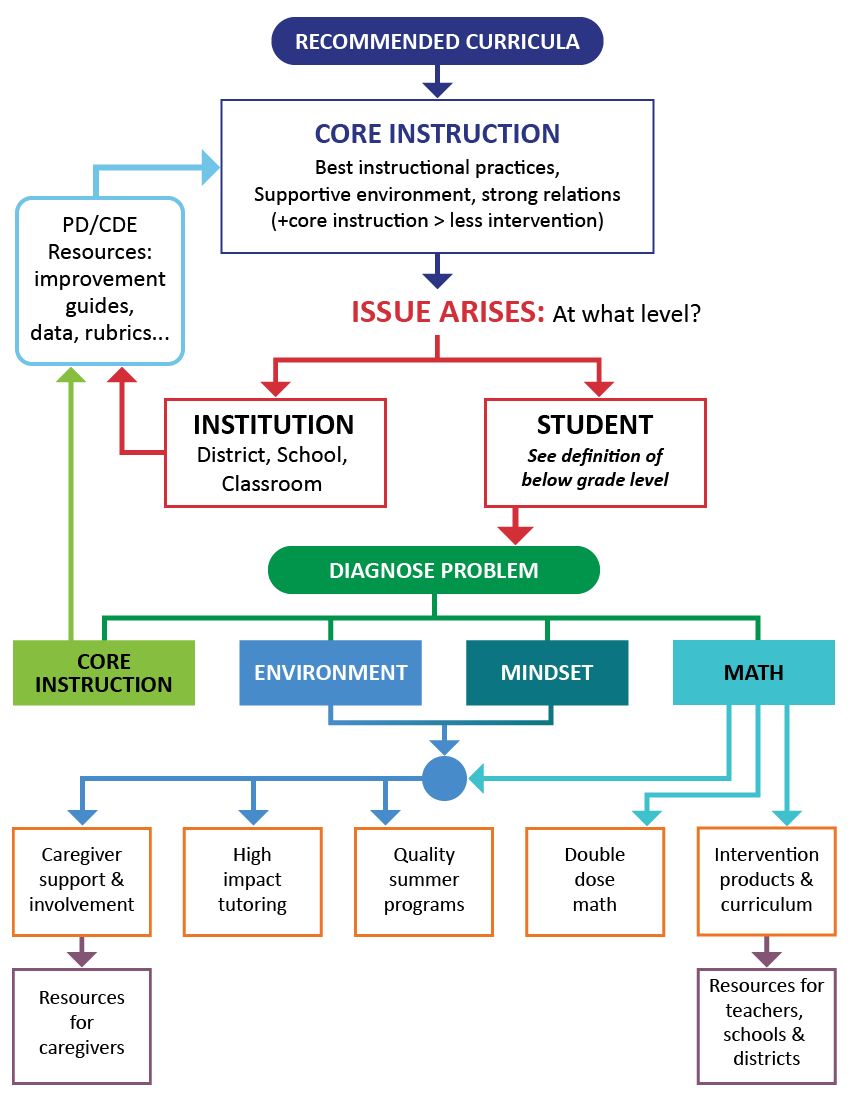You are here
Mathematics Intervention

Colorado Department of Education (CDE) has released free math interventions to support key areas in math education across the state. These comprehensive lessons include resources, assessments and activities designed for educators, families and out-of-school time professionals.
Mathematics Intervention
Some students need extra help to become proficient in mathematics. This help—which often gets called "intervention"—can include things like tutoring, different teaching techniques, mindset adjustments and family/caregiver support. Some interventions are specific, like when one student needs help with one topic. Other interventions are more general, like when groups of students struggle on multiple topics. Either way, we recommend viewing intervention as a process, not just a product to be purchased. Intervention is more than software, manipulatives or training that you can buy. Instead, intervention should focus on the specific needs of each student or group of students, working with them and their support system to help overcome math challenges using the right tools.
Mathematics Interventions at the Student Level
Mathematics Intervention at the Teacher Level
Mathematics Intervention at the Institutional Level
Data-Driven Interventions
Educators should use a variety of data to determine who needs intervention and what an intervention needs to focus on. In addition to student grades and test scores, your data should tell you things like:
- How the student(s) are engaged in the classroom
- If the problem extends beyond a small number of students or topics
- If curriculum materials and instructional methods are aligned and effective
CDE has a rubric and other tools to help you use data more effectively and improve your math outcomes. You are welcome to contact CDE mathematics specialists for help in making sense of your data and implementing interventions.
Your data should now be pointing you in one or more directions. Below, we suggest creating a mathematics intervention plan that may include interventions at the system level, the classroom level or the student level. A more complete flowchart for making intervention decisions is near the bottom of this page.
Developing a Comprehensive Mathematics Intervention Plan

Consider system-level interventions if your data suggests:
- A lack of data or poor data quality at the school level
- Ineffective schoolwide support structures for students
- Weak connections with parents and communities.

Consider classroom-level interventions if your data suggests:
- Learning difficulties are widespread - more than 10 to 20 percent of the class
- Lessons and materials are misaligned with learning goals
- Teaching practices are ineffective

Consider student-level interventions if your data suggests:
- Learning difficulties are isolated (less than 10-20% of a class)
- A student or students struggle with a specific topic
- Activities are needed for extra instructional time
Math Intervention Guidance Flowchart
When students face math challenges and require intervention, diagnosing the root problem is crucial. Similar to how a doctor would not prescribe right arm casts for everyone in an emergency room, in education, educators must address the varying underlying issues of student performance. The following flowchart serves as a tool to examine programs, helping to pinpoint the most impactful course of action.

Related Links
- Definition of "Below Grade Level" or "Struggling in Math"
- Intervention Rubrics to Improve Math Outcomes
- Subscribe to the CoMath Listserv for information to support quality mathematics education in Colorado and updates regarding House Bill 23-1231.
Have questions for the math team? Email mathacceleration@cde.state.co.us.
For further assistance, please contact:


Connect With Us





